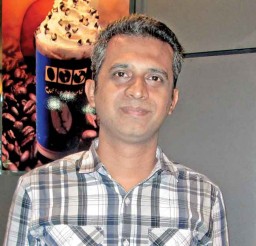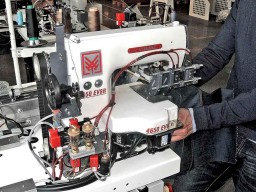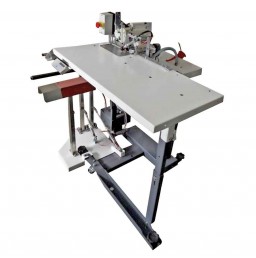
Bangladesh is one of the most important centres for denim apparel production and its exports around the world. In fact, the country has come up as the third most important exporter of denim apparel to US, after Mexico and China; and second highest to EU after China. “Five years ago we hardly had 5 denim mills in the country; today we have 15-20 factories producing denim fabric. The garment manufacturing has benefited proportionately with this change. Pacific Jeans, Universal Jeans, Hameem Group, Mahmud Group, Opex Group, Ananta, Regency, Kenpark, Vintage Denim, Tusuka, Epic Group, and Standard Group are few among the long list of denim RMG manufacturers in the country,” shares Farhadur Rahman Jewel, Manager, Vibemac Bangladesh, the leading sewing technology provider, specializing in automats for jeans manufacturing. Vibemac started its operation in Bangladesh in the year 2000 and has sold more than 4000 machines ever since.
Vibemac has established itself not just as a machine seller, but as a total solution provider for the industry, acting as a consultant for most of their customers. “Our success is not just because of our technology but because of our ability to provide correct solutions. We are involved with the customers right from the layout stage; we study customer’s products and suggest them the correct machineries that are best suited for their need and can considerably reduce the number of machines required in a line. The same production that 70 standard machines yield can be achieved by almost 35-40 machines with the use of automats,” says Jewel. He further adds that with the rising scarcity of manpower, use of automats can considerably reduce the dependability on the same. Expanding on the thought by giving examples, Jewel continues, “Our Auto pocket setter performs 6 operations; thus replacing 6 operations that would have earlier been performed separately. Our Auto pocket hemming machine can stitch 1000 pairs of back pocket, while a standard double needle machine can only produce 200 pairs, thus one such machine can save 5 operators.”

Although there are many popular sewing technology names present in the Bangladeshi market making automats, Vibemac still claims it has little competition. “Although Juki and Brother do manufacture automatic sewing stations, but they are not specializing in denim jeans. Both the companies are majorly selling manually operated machines like SNLS, DNLS, with minor automation like eyelet machines, patterns sewer and bartack machines in Bangladesh. Secondly, PFAFF and SunStar, concentrate more on the structured garment and fixed operation. As our focus is entirely on jeans manufacturing, we are hardly facing any challenge and have a market share of 90%,” reasons Jewel.
Another advantage that Vibemac enjoys over its rivals is that the company manufactures the pocket jigs and attachments for the machines locally and therefore cost less, while its competitors source them from other machine manufacturers and it takes more time and costs even more. Jewel further adds, “Another reason for our success is that while our competition machines can only perform one operation, Vibemac machines are multipurpose. For example, an auto pocket setter can also do decorative design stitch, patch pocket attach, flap top stitching.” The other factor worth mentioning, which works in Jewel’s favour while marketing his machine, is the acceptability that Vibemac has with Bangladeshi operators who have been familiar with this user-friendly brand for over 13 years. Also the Vibemac team in Bangladesh is well equipped with experience technical team to provide instant best level service support to their valuable clients.

To maintain its edge in the market, Vibemac is continuously involved in R&D, developing its machines as per the requirement of the buyers. The company keeps an eye on the forecasts for the coming season and develops its machines accordingly. “For the coming season Zara is looking for cross bartack in loops, so we would develop a program in the machine accordingly. We have previously done the same for Diesel, Replay, True Religion. Prior to releasing their designs, they send us the samples and we develop the pocket design of them and which they later suggested to their vendors,” adds Jewel.
Unlike many, Jewel does not believe that the recent Rana Plaza-like disasters have any adverse effect on business in Bangladesh. “It was an accident and it should just be taken as a singular event. It has only made Bangladeshi manufacturers more pro-active in taking measures to ensure that something like this should not be repeated,” said Jewel. The biggest challenge, he says, for the Bangladeshi jeans industry right now is the lack of educated personnel for mid-level management. “An educated and well trained staff can better handle unexpected problems, which we often find that our present staff is ill-equipped to handle. It is imperative for us to establish institutions for training in apparel and textile sector,” he concludes.






